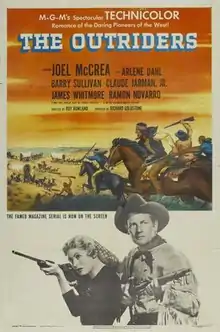The Outriders
The Outriders is a 1950 American Western film directed by Roy Rowland and starring Joel McCrea.
| The Outriders | |
|---|---|
 Film poster | |
| Directed by | Roy Rowland |
| Produced by | Richard Goldstone |
| Screenplay by | Irving Ravetch |
| Story by | Irving Ravetch |
| Starring | Joel McCrea |
| Music by | André Previn |
| Cinematography | Charles Schoenbaum |
| Edited by | Robert J. Kern |
| Color process | Technicolor |
Production company | Metro-Goldwyn-Mayer |
| Distributed by | Metro-Goldwyn-Mayer |
Release date |
|
Running time | 93 minutes |
| Country | United States |
| Language | English |
| Budget | $1,621,000[1] |
| Box office | $2,179,000[1] |
Plot
With the Civil War nearing an end, rebel soldiers Will Owen, Jess Wallace and Clint Priest are released in Missouri from a Union stockade. A bandit leader and Confederate sympathizer, Keeley, recruits them to join a wagon train run by Don Chaves that is carrying a million dollars' worth of gold bullion.
The men see it as a chance to help the South and also profit. Don Chaves is suspicious of them, but permits them to be outriders, accompanying the wagon train but staying 200 yards from the others. Apaches attack and the three men help fend them off, gaining the Don's trust.
The beautiful widow Jen Gort attracts the interest of Will and Jess, who have a falling-out. She is escorting teenaged Roy, her young brother-in-law, who is eager to prove his courage to the older men by fighting Indians by their side. The boy ends up inadvertently causing a stampede, however, then drowns while attempting to cross a raging river.
News comes that the war is over. Because of that, plus his love for Jen and admiration for the Don, the robbery no longer interests Will, but Jess is determined to go through with it so that he and Keeley can split the money. A gunfight ends in Jess's death, so that Will and Jen can go on with their lives.
Cast
- Joel McCrea as Will Owen
- Arlene Dahl as Jen Gort
- Barry Sullivan as Jess Wallace
- Claude Jarman, Jr. as Roy Gort
- James Whitmore as Clint Priest
- Ramon Novarro as Don Antonio Chaves
- Jeff Corey as Keeley
- Ted de Corsia as Bye
- Martin Garralaga as Father Damasco
Production
Parts of the film were shot in Duck Creek, Aspen Mirror Lake, Strawberry Valley, Paria, Long Valley, and Asay Creek in Utah.[2]:288
Reception
According to MGM records the movie earned $1,540,000 in the US and Canada and $639,000 elsewhere, making a loss to the studio of $497,000.[1]
See also
References
- The Eddie Mannix Ledger, Los Angeles: Margaret Herrick Library, Center for Motion Picture Study.
- D'Arc, James V. (2010). When Hollywood came to town: A history of moviemaking in Utah (1st ed.). Layton, Utah: Gibbs Smith. ISBN 9781423605874.
